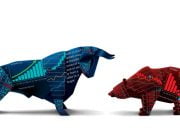Market noise is relentless. Financial headlines scream about the same handful of stocks while important opportunities—the kind that can meaningfully impact your portfolio—often fly completely under the radar.
That’s exactly why we publish this watchlist each week.
While most investors are distracted by mainstream narratives, we’re digging through earnings transcripts, analyzing technical setups, and monitoring institutional money flows to identify companies at potential inflection points. Our focus isn’t on what’s already priced in, but rather on what the market hasn’t fully appreciated yet.
Each week, we spotlight three stocks that merit your attention. We focus on opportunities where timing, valuation, and catalysts align to create potentially favorable entry points.
Our rigorous analysis goes beyond surface-level metrics to identify opportunities that most retail investors don’t have time to uncover. Each pick comes with clear reasoning, specific triggers to watch for, and a compelling risk-reward profile designed to help you make more informed investment decisions.
Here’s what caught our eye this week:
Alphabet (GOOGL)
Alphabet shares have fallen approximately 27% from their high amid market volatility and ongoing antitrust litigation, creating what appears to be an attractive entry point for long-term investors. Trading at around $162 per share, the parent company of Google now trades near a multi-year low from a price-to-earnings perspective despite maintaining dominance across search, video streaming, mobile operating systems, and cloud infrastructure. What makes this opportunity particularly compelling is the combination of Alphabet’s reasonable valuation (with a price/earnings-to-growth ratio of just 1.2) and its multiple growth avenues in artificial intelligence that seem largely disconnected from antitrust concerns.
While the headlines around Alphabet’s antitrust cases appear troubling at first glance, investors may be overreacting to potential outcomes. Even in scenarios where Google is prevented from paying Apple for Safari search placement or forced to sell Chrome (which commands 66% global web browser market share), the company’s deeply integrated ecosystem would likely preserve significant network effects. Chrome’s tight integration with Google’s productivity apps creates user stickiness that would be difficult to dismantle without extraordinarily aggressive regulatory action that seems unlikely given the complexity involved.
Beyond its core business resilience, Alphabet is aggressively positioning itself across multiple AI opportunities that could represent significant future growth engines. These include AI-fueled growth in cloud services, expanding autonomous ride-hailing through Waymo, quantum computing development, and its competitive Gemini AI models for both consumers and enterprises. With the stock’s recent pullback creating a more attractive valuation entry point, investors willing to look beyond near-term headline risks may find Alphabet offers an increasingly favorable risk-reward profile as the company continues leveraging its massive data advantages and engineering talent to capitalize on emerging AI opportunities.
PepsiCo (PEP)
PepsiCo’s shares have fallen approximately 25% from their 2023 peak and 7% year-to-date, significantly underperforming both the broader market and the typically defensive consumer staples sector. Trading at around $133 per share, this consumer staples giant now offers a historically high dividend yield of approximately 4.1% – higher than during the Great Recession. What makes this setup particularly compelling is the disconnect between PepsiCo’s stock performance and its fundamental resilience, evidenced by its recently announced 5% dividend increase – marking its 53rd consecutive annual increase and earning it the coveted Dividend King status.
The market appears fixated on several short-term headwinds facing the company, including a slowdown in its salty snacks business, consumer shifts toward healthier eating habits, and the inability to push through large price increases as it did during the post-pandemic inflationary period. However, these concerns seem overblown when considering management’s 2025 guidance for low-single-digit organic sales growth and mid-single-digit core earnings-per-share growth – hardly catastrophic results for a company of PepsiCo’s size and market position.
From a valuation perspective, PepsiCo now trades below its five-year averages across multiple metrics including price-to-sales, price-to-earnings, and price-to-book value ratios. This compelling valuation, combined with the company’s active portfolio reshaping through strategic acquisitions, suggests the current price represents an attractive entry point for patient investors focused on long-term compounding rather than short-term market sentiment. For those seeking income stability with growth potential, PepsiCo’s combination of brand strength, diversified product portfolio, and historically high dividend yield creates an increasingly favorable risk-reward profile at current levels.
The Trade Desk (TTD)
The Trade Desk has experienced a dramatic 65% decline from its all-time highs, creating a compelling opportunity in the digital advertising technology space. Trading at around $54 per share, the company’s stock suffered an initial 30% single-day drop in February after missing revenue guidance for the first time in company history – an event attributed to transitioning clients from an old platform to a new one rather than fundamental business deterioration. What makes this setup particularly intriguing is the stock’s current forward price-to-earnings ratio of 27, the lowest level at which we have data for The Trade Desk trading, despite robust growth projections of 17% revenue growth in 2025 and 20% in 2026.
The Trade Desk occupies a strategically advantageous position in the digital advertising ecosystem, focusing on the buy-side of the marketplace by helping advertisers place their content in optimal locations. The company has established particularly strong footholds in high-growth categories like podcast audio and connected TV, where advertising is increasingly shifting from traditional linear television. This positioning provides The Trade Desk with significant tailwinds as the broader transition from traditional to digital advertising continues across multiple channels.
While market sentiment has clearly turned negative on growth-oriented technology stocks amid recent economic uncertainty, The Trade Desk’s fundamental business advantages remain intact. The company’s ad-buying software addresses a massive global advertising market with substantial room for further digital penetration. For investors willing to look beyond near-term volatility, The Trade Desk offers an opportunity to acquire shares in a category-leading company with established technology advantages and significant growth potential at a valuation that represents a historical bargain compared to its own trading history.






